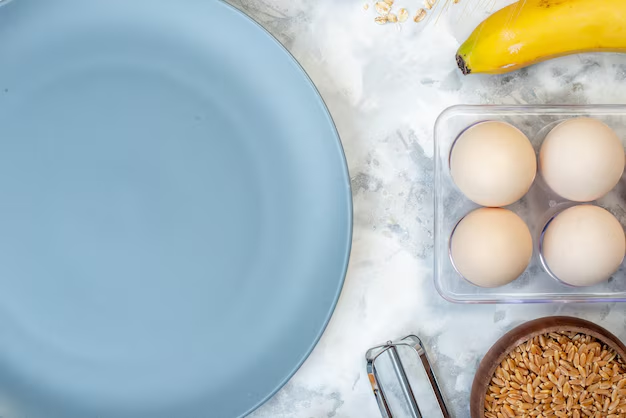How Long Do Egg Yolks Last in the Fridge? Cracking the Mystery of Egg Storage!
When it comes to mastering kitchen essentials, understanding egg storage is a must. From scrambling morning breakfasts to preparing delicate custards, eggs play a crucial role in our culinary endeavors. But, what do you do when a recipe calls for egg whites or your baking project leaves you with spare yolks? How long do these egg yolks really last in the refrigerator? Let’s explore this intriguing topic of food storage, offering you insights and practical tips to keep your yolks fresh and safe.
🥚 The Importance of Proper Egg Storage
Eggs are one of the most versatile ingredients in the kitchen, but they are also delicate and perishable. Improper storage can lead to spoilage and foodborne illness. Knowing how to store eggs and their components can make all the difference in your cooking and health safety.
Understanding the Shelf Life of Egg Yolks
Egg yolks, which are packed with nutrients and fats, require specific attention once separated from the egg whites. Their storage depends greatly on how they’re handled right after separation. In general:
- In the Refrigerator: Freshly separated yolks can be stored in a sealed container for up to 2 days.
- Freezing: For longer storage, freezing yolks (with a pinch of salt or sugar to prevent gelatinization) can extend shelf life for up to a year.
💡 Tips for Storing Egg Yolks in the Fridge
The process of storing egg yolks might seem straightforward, but certain steps can shield them from spoilage and extend their usability.
1. Separation Technique
Ensure that when you separate yolks from whites, no residual egg white is left. This helps in maintaining the integrity and longevity of the yolks.
2. Moisture Retention and Prevention of Skin
To prevent yolks from drying out or forming a skin:
- Cover them with cold water or milk.
- Alternatively, brush them with a thin layer of oil.
Pro Tip: Always drain excess liquid before using yolks in your recipe!
3. Choosing the Right Container
Store yolks in a small, airtight container to reduce exposure to air and odors. Label the container with the date of storage to track their freshness.
4. Temperature Matters
Keep the temperature consistent; ideally, the fridge should be at 40°F (4°C) or lower. Avoid placing yolks in the door compartment to maintain stable temperatures.
🗂️ Common Uses for Stored Egg Yolks
Stuck with leftover yolks and need some inspiration? Here’s how you can put them to good use:
- Custards & Sauces: Egg yolks add richness and a silky texture to custards and sauces like hollandaise.
- Mayonnaise & Dressings: Whip up homemade mayonnaise or creamy salad dressings.
- Baking & Desserts: From cakes to cookies, yolks enhance the flavor and moisture in many baked goods.
- Frittatas & Omelets: While more whites are used, yolks add a creamy texture to egg dishes.
🍳 Understanding Signs of Spoilage
Before using stored yolks, it's crucial to check for signs of spoilage. Here are some indicators that yolks should be discarded:
- Off Smell: Any foul or unusual odor is a clear sign to toss them out.
- Discoloration: If yolks appear cloudy or have changed color, they are likely spoiling.
- Texture Changes: Sliminess or any unusual texture is a red flag.
📝 Quick Summary: Storing Egg Yolks
| Step | Method | Duration |
|---|---|---|
| Refrigeration | Seal and cover with liquid | 1-2 Days |
| Freezing | With salt/sugar; airtight container | Up to 1 Year |
| Signs of Spoilage | Smell, color, texture | Check before use |
🔄 Transitioning from Leftover Yolks to Delicious Dishes
Once your yolks are correctly stored, the next challenge is to incorporate them into delicious meals. Here are a few creative ideas:
Pasta Carbonara
Egg yolks create a creamy sauce for pasta carbonara, adding depth and flavor that’s hard to beat.
Creme Brulee
A classic dessert that showcases the richness of yolks with a perfect caramelized sugar crust.
Aioli Sauce
Turn yolks into a sophisticated dipping sauce flavored with garlic and lemon for seafood or vegetables.
Enriched Doughs
Utilize yolks in brioche or other enriched doughs, providing them with a soft crumb and golden color.
⏲️ Extending Shelf Life: Alternatives to Refrigeration
While refrigeration is the most common method for storing egg yolks, there are alternative ways to extend their shelf life.
Dehydration
Dehydrating yolks can transform them into a shelf-stable powder perfect for long storage. This method is labor-intensive but rewarding.
Canning or Pickling
Another uncommon yet achievable method is canning or pickling yolks. This requires precision and careful preparation to ensure safety.
Chemical Preservation
While more of a commercial approach, chemical preservation using safe preservatives can extend yolk shelf life under specialized conditions.
🔍 Closing Insights on Egg Storage
Storing leftover egg yolks doesn’t need to be a challenge if you follow best practices. By understanding proper handling, storage methods, and signs of spoilage, you can keep yolks fresh and your recipes delectable. Whether you’re a seasoned chef or a home cook, these methods offer flexibility and creativity in the kitchen.
Exploring historical methods or innovative approaches to storing egg yolks can also lead to delightful experiments and newfound culinary experiences. With these tips, crack open new possibilities and let those golden orbs shine in your cooking adventures! 🥚✨
Remember, when in doubt, the fresher, the better! Keep an eye out for storage tips and always prioritize food safety in your kitchen pursuits.

